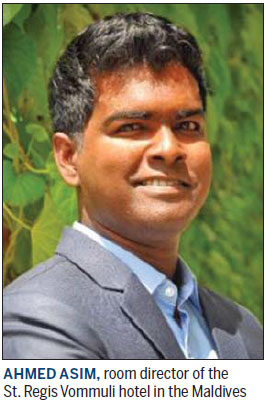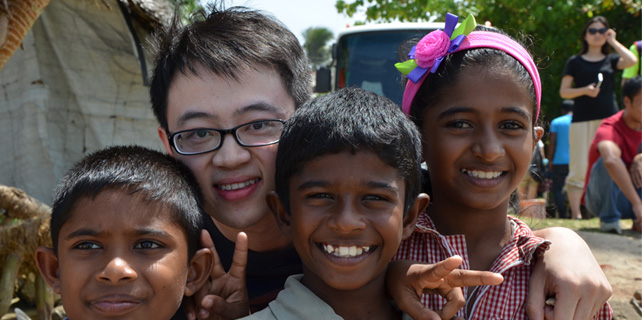From a young age, a ticket to a dream role in paradise
When Ahmed Asim was a boy his career path had already been laid out before him
"My job is to make people feel at home, literally, since this has been my home for the past 30 years," says Ahmed Asim, room director of the St. Regis Vommuli hotel in the Maldives.
Between his generation and that of his parents, his country has turned from a gathering of specks in the Indian Ocean to one of the world's best-known and most desired escapes.
Yet for Asim, the notion of escape is virtually nonexistent, if not laughable.

"For me, this only provides an initiation to the outside world as they are coming to us in planeloads."
His entry into this world came early, he says. When he was at primary school, property owners invited him and his classmates to tour the resort islands, where human endeavor tries to emulate natural beauty in creating paradise on Earth - sometimes with unintended results.
"'Wow!' was my reaction," Asim recalls, casting an incredulous look. "Then I told myself: 'Someday I'm going to work here.'"
The wide-eyed child has given way to a soft-spoken man with a confident air, and in the meantime he has gained a diploma in hospitality and worked as a trainee butler and then as a butler for many years in a number of hotels, some of them luxury ones. He joined the St. Regis at Vommuli as room director in October, when preparations were being made for the hotel's grand opening.
"Between 50 and 60 percent of our 300-strong staff are Maldivians," Asim says. "Quite a few of us, including me, are in management."
Spending the bulk of his time in air-conditioned rooms or traveling in buggies from villa to villa, Asim's life is a world apart from that of his parents, who have seven children in total.
"Like most Maldivian families of their generation, my father made a living out of fishing while my mother did household chores. The sea around here is probably the calmest on Earth. I've never heard of anyone who died out fishing in the sea. But still, the sun and the wind can be unforgiving; that's why few young people are involved in fishing today."
His father usually left home about 5:30 am and fished for tuna all day before returning in the evening, he says.
"Ours was a small boat. There were also bigger boats on which one can go out fishing in the sea for weeks at a time. But whatever you go out in, small or big, fishing in the Maldives has to be by pole instead of by net. We do angling all the time. The fish nets are reserved only for the capture of baitfish - fish used as bait when angling.
"Our government has been very aggressive when it comes to environmental protection. That's why we still have what we had 20 or 30 years ago."
Asked whether angling is a financially viable way of fishing, Asim says that on a good day, a good angler can catch up to 2,000 tuna. The fish tend to appear in groups, and when you really think about it, that kind of catch suggests the fish must be virtually jumping onto the hook, if not directly into the boat.
These days, though, fishing has decreased compared with 20 years ago. Asim's parents stopped fishing about 15 years ago and now live in Male, the country's capital. The catch, apart from fulfilling local needs, goes on to the dining tables of tourists.
At the St. Regis, amid offerings of caviar, lobster, truffle, foie gras and Kobe beef, I discovered a course unpretentiously titled "Catch of the day". I tried it and did not regret my decision. Later, as I spent my last day in the Maldives at the Sheraton on Full Moon Island, I encountered the same offering and realized that it was a local signature dish.
Ayyoub Salameh, director of culinary service at the St. Regis, says the hotel buys 600 kilograms of fish each day from local fishermen for the consumption of guests and hotel staff. It also buys produce from local farmers.
"I don't think I'll stay in the country for life, so I'm going to deliver something for it," says the master cook, a Jordanian, who is also creating a garden for local spices and herbs.
Similar willingness is also expressed by Wong Chiu Man and his wife Maria Warner Wong, the architectural duo and Harvard graduates who designed the St. Regis at Vommuli.
"The Vommuli House is inspired by the extending roots of banyan trees," Warner Wong says. "The parts were prefabricated and pre-engineered before being sent to Vommuli for rapid erection with the help of Maldivian workers. In this way we have tried to be environmentally friendly while passing on construction skills to locals."
Once, the couple was invited for a drink at a nearby island, only to discover that the hostess, a Maldivian who had previously worked on the construction site at Vommuli, had fashioned her little bar using discarded plywood she had gathered from the St. Regis site.
Wong Chiu Man, asked about any misgivings he has about the hotel's design, said that if he had his chance again he would pay greater heed to any risks such a project posed to the environment. "The construction of the water villas did cause the bleaching of corals on a scale I hate to see."
But as tourists pour in, won't further stress be put on the country's unspoiled beauty and fragile ecosystem?
"I don't see that happening," Asim says. "First of all, the Maldives is a high-end tourist destination, as we cater to a niche market. This is especially true in our case. For the moment, the government has adopted a very positive attitude toward developing tourism. A college in Male offers a master's degree in hospitality and tourism."
However, he acknowledges that even though tourists started coming to the Maldives in the 1970s, it is only in the past five years that the country's tourism industry has really taken off.
Asim, married with a two-and-a-half-year-old son, sees differences in the ways childhoods were spent before and now.
"For me it was just the sun, sand and sea; for him it's more about colorful toys."
Because of Asim's job, he can see his wife and son as often as he would like to.
Fan Qianyi, a Chinese diving coach at Vommuli, says this kind of family living arrangement is common among young Maldivians.
"I've been here for four years but haven't seen many Maldivian women. Usually men work outside, on resort islands, while women and children stay behind, in what's known as the local islands. It reminds me of migrant workers in China - certainly not the best solution."
Twenty years ago, when Asim first visited a luxury hotel at a resort, he dreamed of being part of what he saw. He has higher hopes for his son. "I won't object if he wants to go into the tourism industry - my parents have been very encouraging and all my brothers work in catering - but it would be great if he becomes a doctor or a lawyer."
For some Maldivians, a simple life, though hard, may have started to change along with their long-held sense of contentment.
But with all the building and opening of luxury hotels, is there any talk about possible gentrification, the effect of which might be mitigated by the geographical isolation of each island?
"Such an idea has yet to come to the Maldives," Asim says.
(China Daily European Weekly 01/27/2017 page16)






















